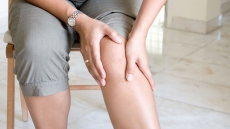TORONTO — The federal government says it's developing regulations to ban the use plastic microbeads in personal care products.
Microbeads are small particles that are used in a range of personal care products such as body scrubs and toothpaste.
Officials say a scientific review that included an analysis of more than 130 scientific papers, as well as consultations with experts, has revealed that the presence of microbeads in the environment may have long-term effects on biological diversity and ecosystems.
Labour Minister Kellie Leitch says the government plans to add microbeads to the list of toxic substances under the Canadian Environmental Protection Act, and intends to develop regulations banning the manufacture, import, and sale of microbead-containing personal care products.
The New Democrats introduced a motion in March calling for a ban on plastic microbeads, and NDP MP Megan Leslie pointed to McGill University research that discovered alarming quantities of microbeads in the St. Lawrence River last year.
Ecojustice executive director Devon Page says the environmental group is pleased to see the federal government responding to mounting public concern over the continued use of microbeads and their impact on Canada's rivers, lakes and streams.
"We look forward to the swift introduction of regulations that will bring this ban into force," Page said Friday in a release.
When products containing microbeads are used and rinsed down the drain, the tiny plastic microbeads are too small to be caught by wastewater treatment facilities and go directly into lakes, rivers and streams.
Scientists have found millions of microbeads in parts of the Great Lakes, with the highest concentrations occurring near urban areas. Studies have estimated that microbeads make up 20 per cent of plastic pollution in the Great Lakes.
Microbeads can then absorb dangerous pollutants — such as PCBs — that are already present in the marine environment. When fish, birds and other wildlife eat these plastics, the harmful pollutants accumulate and eventually contaminate the fish and other wildlife species consumed by humans.
"Banning microbeads from personal care products will help us to continue protecting the environment for present and future generations," Leitch said. "We will continue to take action to keep Canada's lakes and rivers clean, and put the priorities of Canadians first."
Page said Ecojustice also hopes the government will extend the ban to so-called "biodegradable" microbeads.
Some biodegradable plastics only partially degrade, leaving residual fragments to linger in the environment, while others degrade into various components, including toxic inorganic compounds, Page said.
Meanwhile, Edmonton's TerraVerdae BioWorks Inc. announced Friday that it can produce biodegradable plastics from waste-derived methanol.
"TerraVerdae's process uses 'green' methanol from, forestry, municipal, agricultural or industrial waste sources, instead of petroleum or sugar-based sources," the company said in a release.
"The first of our products using this technology, biodegradable microspheres, are a natural substitute for plastic microbeads commonly used in personal care and cosmetic products like toothpaste and body scrubs."





